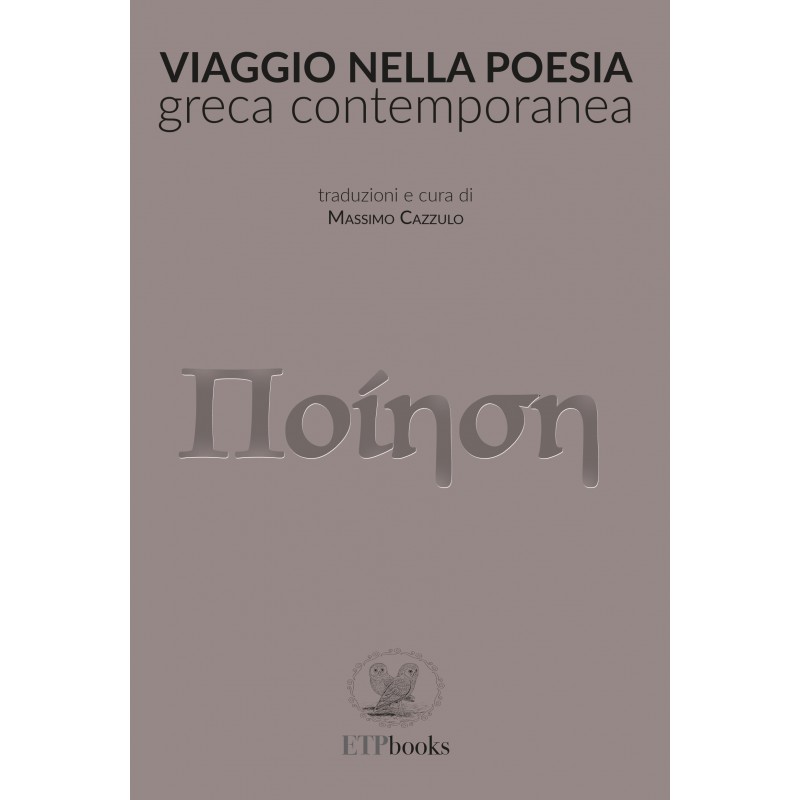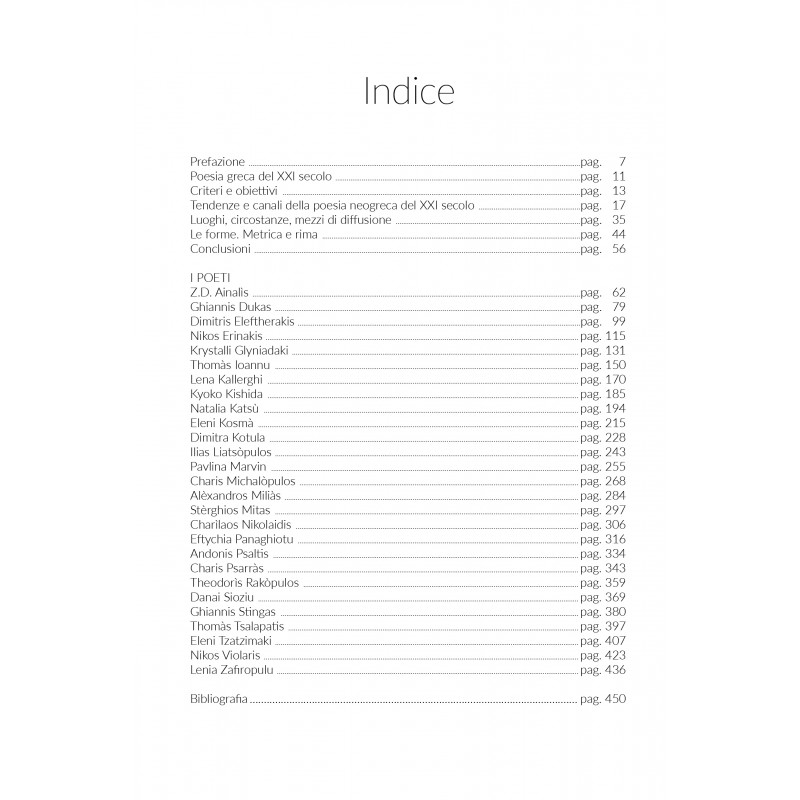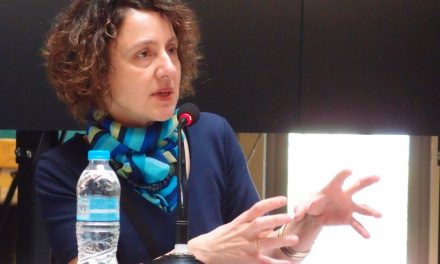Massimo Cazzulo is a classical philologist (he teaches Ancient Greek and Latin in Italy) and translator. He has translated Greek poets (including Odysseas Elytis, Yiannis Ritsos, Antonis Fostieris, Giannis Dallas) and prose writers (among which Maro Douka, Margarita Liberaki and Giannis Panou). He has written critical studies on ancient and modern Greek literature in literary journals and newspapers. He cooperates with the newspaper Avgi. The anthology Viaggio nella poesia greca contemporanea (Etpbooks) is his most recent work. The Greek translation of the anthology is underway by the same publisher. His essay Monemvasià. La signora dei mari (Etpbooks) is also under publication.
Massimo Cazzulo spoke to Reading Greece* about his latest writing venture Viaggio nella poesia greca contemporanea, which aims to “present to the Italian audience the most important poetic production of the last twenty years in Greece, aspiring at the same time to delve into the most recent works of modern Greek poetry”. He also commented on what motivated him to turn to the study and translation of modern Greek literature, as well as on the main challenges he was faced with while translating Greek writers and poets in Italian. He noted that “translation enables peoples to meet and get acquainted with other countries and different mentalities”, and concluded that “if we really want a Europe with a common soul, then we have to strive in order know each other in depth and this can be achieved through our writers, which constitute our countries’ best ambassadors given that they represent the spirit of their culture, that is the essence of their people”.
Your latest writing venture titled Viaggio nella poesia greca contemporanea was recently published by ETP Books. Tell us a few things about the book.
The book is an anthology with a two-fold aim: to present to the Italian audience the most important poetic production of the last twenty years in Greece, aspiring at the same time to delve into the most recent works of modern Greek poetry. In Italy, modern Greek literature is almost exclusively known through Cavafy, Ritsos, Seferis, Elytis and Kazantzakis. Undoubtedly they constitute holy monsters of international literature; yet this anthology gave me the opportunity to move a step forward, that is to show that there are young male and female poets who continue this major tradition, which have taken over from the major representatives of the generation of the 1930s, the post-war generation, the 1980s generation etc. And they have done so in their own distinct way, opening up to new perspectives. When the spectrum of writers is broadened, foreign readers have a wider range to choose from and thus realize that the ground is fertile and flourishing, that the course of Greek literature didn’t stop to the aforementioned literary giants. Let me mention that younger writers – or rather younger poets in the case of the anthology – introduced innovative ways of writing and exploring the poetic text, as well as new perspectives. In other words, the changed the literary points of reference. A lot of young poets have been influenced by Anglo-Saxon poetry, many have studied abroad or are living in foreign countries, thus drawing their inspiration from foreign poetic styles.
I tried, with the help of some friends in Greece who specialize in poetry, and through the reading of critical reviews and studies, to discover the most important poetic voices among the male and female poets that were born after 1974, and this was the starting point for my selection, without of course having exhausted the subject. Let me just say that all the poets anthologized have published their works after 2000.
Yet, given that the anthology aspires to chart the poetic waters of the twenty first century, when things are still quite fluid, and the painting is still underway, we decided together with my publisher to move forward with a Greek edition as well, in which the introductions will be translated into Greek and the poems (the same poems as with the Italian edition with a few changes and some additions) will be published in the prototype. I added three writers that I meanwhile discovered and which I consider equally important. This new edition is expected the following spring.

Which, in your opinion, are the main themes the young generation of Greek poets anthologized in your book delves into? Would it be feasible to talk about a new ‘poetic generation’ nowadays?
That’s not an easy question to answer…First of all, the poetic themes are numerous and they quite often intersect and are mutually influenced. Since 2010 Greek poetry has been regarded, especially abroad, as a poetry of the crisis. This word has become almost ‘magical’ maybe because, as Kostas Voulgaris noted in his article to newspaper Avgi, that the word ‘crisis’ is conducive to selling books. Indeed, from 2014 to 2016 there were published three high quality anthologies of modern Greek poetry, that is Greek Poets on the Crisis (2014), Futures: Poetry of the Greek Crisis (2015), Austerity Measures (2016). More than 90 male and female poets were presented translated into English. It’s beyond doubt the biggest translating venture from Greek into a foreign language. An excellent job yet with some thematic imbalances.
Indeed, if one notices the publishing dates of the works and analyzes the themes in their entirety, it becomes evident that the crisis is just one of the motives behind the poems. Undoubtedly, of course, the social and economic condition in Greece has influenced many of the texts, yet the analysis should go beyond this point of reference if we don’t want to mar this multi-faceted picture. After all, literature has always constituted an answer to reality. In my introduction, I tried to show that there are a number of important points that link the poems of Manolis Anagnostakis and Giannis Dallas, for instance, with the poems of younger poets. This means that the reaction of the poet or the scholar to his/her surrounding reality is not something new but has always been the weapon through which the writer interprets the world with its respective crises, its communal inequalities, its wrongs…
We should add that even a first look at this panorama discloses a wide range of themes, while it confirms that classical themes (erotic, existential, psychological, political etc) continue to arouse the interest of poets. The illusion is explained, in my opinion from the fact that it is easier to promote to foreign markets books that talked about the socio-economic crisis in Greece, at a time when newspapers, televisions etc were focused on the situation in Greece on a daily basis and the country had become of symbol of pseudo-solidarity of a united Europe. Yet, I have the impression that quite often the poems that talk about the crisis are not poems but emotional responses written in verse, documents and not poems. Poems follow certain rules (rhythm, prosody, vocabulary…) which immediate reactions usually don’t. After all, most of the poems of protest were just confined on the internet, lost in an ocean of oblivion or written on walls as graffiti.
As for your second question, I don’t think that we could at this moment talk about a generation, considering that young poets, even if they have some things in common, don’t yet have points of references and living experiences as close as those of the previous generations. That is, they do not have an international movement as their binding thread as the generation of the 1930s, nor have they experienced some traumatic events as the generation of ‘defeat’, nor the ideological trauma of the generation who experienced the consequences of the Civil War and the Dictatorship, nor the ideological disorientation that the fall of the Berlin Wall inflicted upon the generation of the 89. Thus I reckon that young poets aspire to underline their uniqueness and not to find common ground with their fellow poets. It’s the generation of the individuality, without the term acquiring negative connotations. I reckon that it would be difficult to encounter collective works such as Triodio or Anthodesmi, just to mention some of the collective poetic works of the previous century. A poetic generation should have a common vision to flourish.
What motivated you to turn to the Greek language and more specifically to the study and translation of Modern Greek literature?
I would say that it’s my great love for Greece and the Greek language; a love born at the age of fourteen, when I started learning ancient Greek at school, inspired by the passion of my teacher. From then onwards, everything moved on smoothly, as if it was a matter of fate. I turned to translation thanks to friends that were specializing in translation and the publication of Greek books, and more specifically Nicola Crocetti, an excellent translator and publisher of numerous Greek writers. It was in his workshop that everything started form me. After all, translation is destined for those who love a culture, a way of making others share this love. When I read, for instance Ritsos, Elytis, Fostieris, Dallas and so on, I always wondered how I could manage to make Italians know them as well. Literary translation is after all the sharing of feelings. Let me just say that the idea to translate Greek literature started quite early given that (during the 1980s) on the shelves of Italian bookstores you could only find Cavafy or come across some work of Ritsos or Seferis just by chance.

Which were the main challenges you were faced with while translating Greek writers and poets in Italian?
Translation is a desolate job…As the American poet Robert Frost eloquently put it: poetry is lost in translation…Yet it’s the only way for foreign readers to get acquainted with the writers of another culture. All of us have read a number of writers in translation and we owe our acquaintance with foreign literatures to translators. The difficulties and challenges of translating Greek poetry depend, in short, on the syntax, the density of words, and primarily on prosody. There are male and female poets that have written amazing rhymed sonnets, while there are others whose poetic style depends on, what Elytis called ‘plays of language’; Elias Liatospoulos, Stergios Mitas, Dimitris Eleftherakis, Pavlina Marvin, for instance, make full use of the mines of language and its rhythms. It’s a kind of poetry Elytis called ‘prismatic’, that is a poetry in which expressive means become autonomous, both signifiers and signified. When I translate a rhymed sonnet without respecting its prosody, I actually betray the literary character of the work and thus the foreign reader ends up with a mediocre text considering that the glow of verbal prisms didn’t manage to penetrate the filter of translation. Of course syntactic structures cause problems given that there isn’t always a correspondence between two languages. For instance, given than in Italian the first word is the subject, what should a translator do when a verse in Greek starts with the object? To keep the Greek syntax violating the Italian one or to give a different form to the verse? Let me just mention that some of the most important poets have quite often violated the usual syntax in order to render a word or a verse more powerful and it’s quite difficult to transfer these ‘violations’ in a foreign language. As Elytis said, the success of a text depends on the way one combines the words, on the innovative nature of this combination. It’s like a chemical formula, where any change in quantity or the series of elements leads to a completely different result.
And the sound, of course. Poetry – to use Elytis’ words – constitutes ‘a kind of magic’ which operates thanks to the musicality of words. And the translation of this musicality is quite often very demanding– with the translator making every effort not to lose it so that poetry is not turned into prose. I became fully aware of it when I helped some friends to translate Italian poets into Greek. Excellent translations, but the result was something completely different. Yet, the success of a translation depends on how good a text sounds in your own language given that it is the text that the audience for which you translate will read.
Most scholars reckon that the content of a book cannot be separated from the particularities of the language that gave it shape. In this context, where does the role and responsibility of a translator lie?
I think I have already answered this question. I agree with this argument. It’s one thing, for instance, to read the following verses of Ugo Foscolo in the prototype “Né mai più toccherò le sacre sponde / ove il mio corpo fanciulletto giacque /… / del greco mar da cui vergine nacque..” and quite another to read them in a good Greek translation: “Πλια στη ζωή δεν θα πατεί το δύστυχο ποδάρι / τις άγιες όχθες που άγγιζα στα χρόνια τα χρυσά /… / στο κύμα καθρεφτίζεσαι, στα ελληνικά νερά ”. Apart from the sound of eleven-syllable verse and the rhymes, what is lost is the association “acque-giacque” which is the focal point of the poem, the symbolic archetype of life-death. And what a Greek thinks of the National Anthem’s verse “Σε γνωρίζω από την όψη του σπαθιού την τρομερή” becomes “Ti riconosco dal tremendo taglio della spada”;
Let me repeat that a translation is condemned compared to the prototype; what is important is that this defeat is not turned into a disaster, a loss of all meaning. Yet translation is the most useful job in the world as it opens up gates to foreign literatures and philosophies that we couldn’t otherwise get acquainted with. Who is so well acquainted with the languages necessary in order to read Homer, Sophocles, Virgil, Dante, Solomos, Proust, Mann, Saramago, Dickens, Ariosto, Cervantes, Hikmet etch without one or more translations? Of course, it’s up to every one of us whether he/she wants to ignore other literatures and other cultures because of not knowing their languages or to learn a decade of language to do so.
It is there that the huge responsibility of translators lies. It’s up to them whether a writer will be met with success abroad. The translator may cause damage, make the virtues of a text disappear. I would say that a good translator, as Nietzsche’s classical philologist, remains invisible behind the writer, offers him or her a different voice without aspiring to replace his or her own. When this is achieved, then the result is two-fold: the translated text is met with great success and acts as an autonomous work or it is destroyed. The former is scarce, the latter more than frequent.
Which do you reckon is the profile of the Italian audience that reads Greek literature? And, in turn, what is that makes Italian literature appealing to Greek readers? Are the major similarities that exist between the two countries, as countries of the European South, reflected upon what readers in both countries opt for?
Let’s begin with the fact that readership in Italy is quite low. It would be difficult to talk about the profile of the average Italian readers of modern Greek literature, but I would say that some of their traits would be the following: a. they studied ancient Greek and remember some things of that culture, b. they have spent or are spending their holidays in Greece and were enchanted by the landscape and the people, c. they want to know the literature of the biggest western culture. There are a lot among them that are informed by friends, newspapers, bookstores or who have discovered books of Modern Greek writers by chance. Yet, I reckon that the Greek life and the love they feel about it when they spend a number of days in Greece constitute the major motive.
There is of course, the delicate work of publishers who decided to publish books exclusively on Greece or of Greek writers. ETP Books or Crocetti are cases in point. Gradually they became point of reference and gained the trust of readers. Not to mention institutions such as Società Filellenica Italiana and Società Filellenica Lombarda (which we and some friends founded) that have for the last six years been organizing symposia, lectures, webinars, cultural events about the Greek civilization, with the participation of professors and scholars, promoting books on Greece or of Greek writers. All these initiatives have contributed to the promotion of modern Greek literature in the last few years.
As for the similarities, I am not sure if they influence the options of readers, but it may be so. What matters most is the fact that many Italians have studied ancient Greek, Greek philosophy and art and their imprint will remain indelible for long. Let me point out that Italy is divided in at least two parts. Northern Italy looks towards Northern Europe while Southern Italy looks towards the Mediterranean countries, being fully aware that its origins come from Greece.
Giving that the publishing landscape in Italy is also crisis-stricken, which are the prospects of Greek literature in Italy?
As I already mentioned, in Italy readers constitute a slight minority. Yet, for all the aforementioned reasons, Greek literature doesn’t regress. There is an avid audience for books published and events on Greece organized on a regular basis, despite the adverse conditions we are experiencing.
Could translators act as cultural ambassadors fostering understanding between different countries and cultures?
Of course. Translation enables peoples to meet and get acquainted with other countries and different mentalities. Yet, this is the case for that slight minority that reads; the rest will continue to not read and thus perpetuate the prejudices that arise out of ignorance. But if we really want a Europe with a common soul, then we have to strive in order know each other in depth and this can be achieved through our writers, which constitute our countries’ best ambassadors given that they represent the spirit of their culture, that is the essence of their people.
*Interview by Athina Rossoglou
TAGS: LITERATURE & BOOKS | READING GREECE














